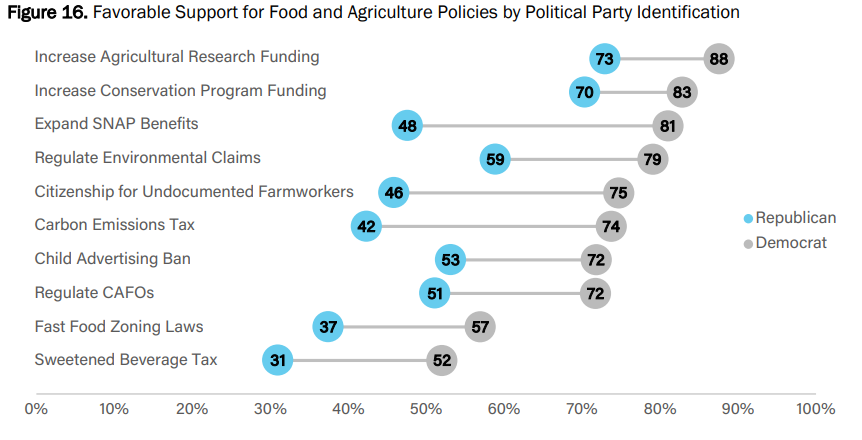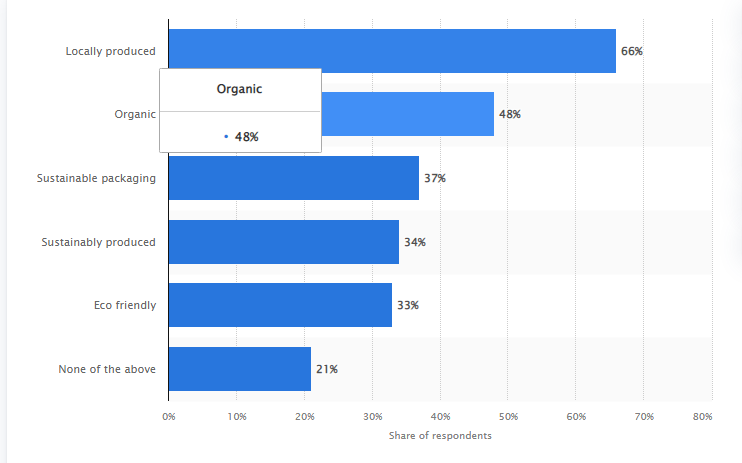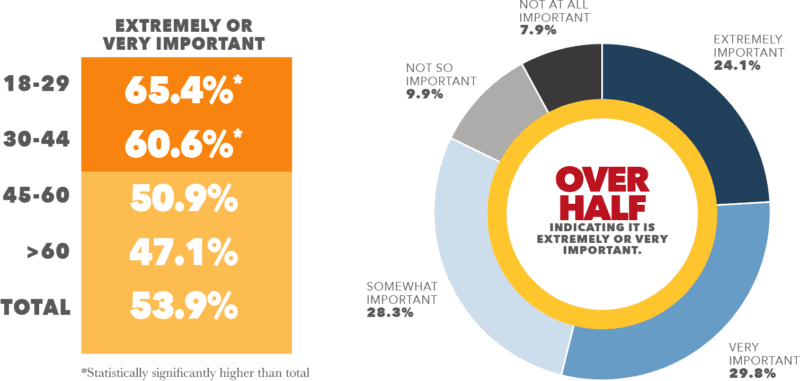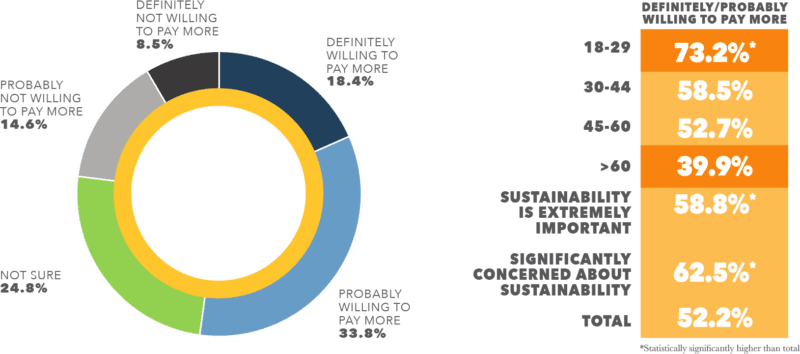Part
01
of one
Part
01
US Ethical Food Consumers
Key Takeaways
- Ethical consumers have an average household income of $56,109.
- According to a survey conducted by Purdue University's Center for Food Demand Analysis and Sustainability (CFDAS), government agencies such as the Department of Agriculture (USDA) and the Food and Drug Administration (FDA), as well as medical professionals such as primary care physicians (PCP) and the American Medical Association (AMA) are the most trusted sources of information by ethical consumers.
- According to a survey of consumers' willingness to pay a premium for sustainable food products, 66% of Americans are willing to pay more for locally produced food, 48% for organic products, 37% for products with sustainable packaging, and 33% for eco-friendly products.
Introduction
The research team has provided five insights on US ethical food consumers. As requested, the research team prioritized insights that address the demographics and psychographics of the consumers. Given the highly specific nature of the subject of interest and the more limited availability of reputable sources, we occasionally used slightly dated research to add robustness, corroboration, or unique insights to the provided findings. Our findings have been provided in slides 2-6 of the attached documentData Availability: Available.
Demographics
- Female consumers who engaged in ethical consumption were on average 45 years old, while male consumers were around 41 years old.
- People between the ages of 55 and 64 account for 40% of ethical purchases, compared to 8% for those between the ages of 25 and 34.
- The average female ethical consumer has completed 13.8 years of education, while the average male ethical consumer has completed 12.5 years of education. The average educational year is 12.5 years for both genders.
- Ethical consumers have an average household income of $56,109.
Who Americans Trust To Inform Them About Sustainable Food Purchases
- According to a survey conducted by Purdue University's Center for Food Demand Analysis and Sustainability (CFDAS), government agencies such as the Department of Agriculture (USDA) and the Food and Drug Administration (FDA), as well as medical professionals such as primary care physicians (PCP) and the American Medical Association (AMA) are the most trusted sources of information by ethical consumers.
- They also trust information from family, friends, and Harvard.
- McDonald's, Nestle, and Chipotle, as well as conservative news outlets like Fox News, CNN, NYT, and Joe Rogan, are the least trusted and relevant media, according to the respondents of "Purdue University's Center for Food Demand Analysis and Sustainability" survey.
Position on Food Policy
- Increases in agricultural research funding and conservation program funding received strong support from both Democrats and Republicans, according to a Purdue University poll.
- Only zoning regulations restricting where fast food restaurants can be located and a 25% tax on beverages with added sugar were opposed by a majority of respondents.
- Democrats favored every policy by at least 13 points more than Republicans but expanding SNAP benefits had the largest favorable support gap between Democrats and Republicans.
Attributes Ethical Consumers Look For In Brands
- According to an IBM survey, seven out of ten respondents are prepared to pay a higher price for brands that encourage recycling, practice sustainability, and/or are environmentally conscious.
- According to an IBM consumer survey, 50% of people think buying "clean" products is highly important. A product that gives health and wellbeing benefits would be purchased by 46% of consumers in the survey.
- Forty-five percent of buyers would only buy a product if it was environmentally friendly or sustainable.
- Forty-four percent of respondents said they would buy items from companies that encourage recycling, and 41% said they would buy from companies that use organic ingredients.
- According to a survey of consumers' willingness to pay a premium for sustainable food products, 66% of Americans are willing to pay more for locally produced food, 48% for organic products, 37% for products with sustainable packaging, and 33% for eco-friendly products.
- According to Cargill's global FATitudes survey, 37% of American grocery shoppers said they were more likely to buy packaged food that claimed to be sustainable.
- According to a survey by Barkley consumer research, 65% of consumers look for products that can help them live a more sustainable and socially responsible life, 60% of consumers buy products and services from companies that are socially and or environmentally responsible, 54% of consumers purchase products or services from brands that take a stand on social or environmental issues, and 43% of consumers buy products and services from companies that are socially and or environmentally responsible.
Post-pandemic Sustainable Food Consumer Attitudes
- According to a consumer survey conducted by C.O.nxt in collaboration with Maeve Webster of Menu Matters, 80% of American consumers believe food sustainability is important in some way, with more than half saying it is extremely or very important.
- Consumers in their mid-forties and younger, according to the study, are deepening their connections and concerns about food and sustainability. Equally, important, the definition of sustainability, which was once viewed solely in terms of the environment by many, is now being viewed in a broader context. Consumers are increasingly tying economic factors like pay equity and working conditions to sustainability.
- Younger consumers (Gen Z and Millennial) and those who place the greatest value on sustainability are more likely to completely trust sustainability claims, according to the survey. Boomers, on the other hand, are much less likely to believe claims. Americans under the age of 44 are the most likely to believe specific claims, while those over 60 are the least likely.
Research Strategy
For this research on US ethical food consumers, the research team leveraged the most reputable sources available in the public domain from market research, business databases, and media sites, including Food Business News, College of Agriculture, Forbes, Purdue University, Statista, IBM, the Journal of International Medical Research, UBC Library, MIT Libraries, the Journal of Diabetes Science and Technology, Journal and e-Health, Sagepub, Agrifutures, among others. Given the highly specific nature of the subject of interest and the more limited availability of reputable sources, we occasionally used slightly dated research to add robustness, corroboration, or unique insights to the provided findings.







